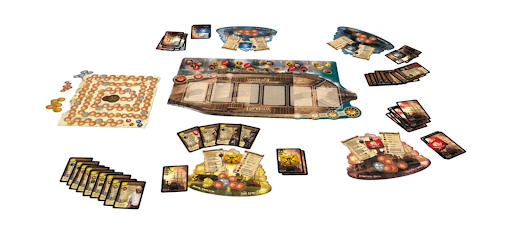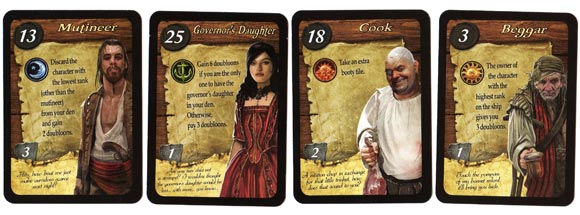Did you know that Free Parking literally does not do anything in the official rules for MONOPOLY? It’s the birthplace of one of the most prevalent house rules in gaming, wherein the money from Income Tax, Luxury Tax, Chance, and Community Chest goes to the center of the board, waiting for someone to pick it up when they land on Free Parking. Players develop these variations for various reasons, such as making a game faster or more palatable for specific player counts. There are huge arguments over whether to factor these player developments into determining a game’s quality. After all, is a game great if it needs new rules added to it to make it work?
One game that has spawned numerous house rules is LIBERTALIA, and they all revolve around one moment in the game: breaking ties. Even 10 years after its release, forums still buzz with discussions of how to make a fairer system than what the game offers. After being the worst kept secret in board gaming for a year or so, a new version subtitled WINDS OF GALECREST finally arrived from Stonemaier Games with 10 more pirates, an excellent single-player mode, and most importantly, a new tiebreaker rule. It adds more strategy and precision to the game, but some will disagree on how well it gels with the existing chaos and ‘beer and pretzels’ flavor.
At its core, LIBERTALIA is a bidding game. Players simultaneously reveal cards with pirates numbered from 1 to 30, then line them up by their numerical value. Card abilities activate from lowest to highest, while treasure drafting starts with the player with the highest value card. The catch is that each round starts with one player drawing six pirates, then each other player adds the exact same cards to their hand. You have to remember what cards your opponents play and which they keep between rounds to try to outflank and bluff your opponents to disrupt your opponents plans while getting your pirates in the most advantageous position.

The significant difference between the two versions rests in breaking ties. In the original, cards had tiny numbers from one to six printed on them. If you and I play the same pirate in a round, we check that little number to determine the order of the cards for that day. This system has some merit; if my pirate has a one or a six on it, I know I’m losing or winning every tie with it. However, if it’s any other number, it becomes much more uncertain about where my pirate will end up. Some people accept this because it fits with the chaotic spirit of the game, while others made their way to the BoardGameGeek forums to come up with dozens of new ideas for breaking ties.
In a series of posts leading up to the release of WINDS OF GALECREST, original designer Paolo Mori outlined the significant changes he wanted to make for the new edition, and the tie-breaking system was first on the list. His solution is the “reputation track,” which players will consult whenever pirates of the same value are played in a round. Whoever has the highest reputation wins and gets the first choice of treasure but activates their ability last. The lower reputation triggers their power, but they might get stuck with worse goodies.
This reputation track is a breath of fresh air for those who didn’t like the seemingly arbitrary tiny numbers of the original. It adds perfect information and awesome moments where thinking you know what everyone else will do backfires spectacularly. Furthermore, there’s no clear answer as to whether getting a higher or lower reputation is better. Some pirates have abilities you want to activate first or last in the day, so it’s better to use them when you know you will lose or win a tiebreaker. Players also get more money at the start of a round if they have a lower reputation, but losing too much reputation will result in losing money as well. Similarly, while having a higher reputation might get you fewer riches at the start of a round, definitively knowing you will win every tie is a massive boon if used correctly.

Given the added complexity, it’s probably not surprising that the reputation system has been accused of adding too much bookkeeping. It’s a whole other decision-making level that can slow the game down, especially at larger player counts, and it has to be adjusted nearly every round. Those who like LIBERTALIA for the chaos and relative simplicity do not mind the original tiebreaker because they treat the game like a popcorn movie: turn your brain off, play cards, screw over your friends, etc. On the flip side, you can steal your opponent’s treasure, discard pirates from their ship, or basically skip their whole turn. These are not mechanics conducive to the more strategically minded who would appreciate the precision of the reputation system. It’s like when UNO ULTIMATE promised to add strategy to UNO through unique decks and wild powers. Fans of UNO were put off by the added complexity, while no amount of those same aspects were enough for specialty gamers to get over their disdain for the evil Wild Draw 4.
WINDS OF GALECREST had a difficult task in correcting an obvious flaw without adding too much baggage, and I think they found the best solution. Those who let the fiddliness bother them are missing out on a clear improvement. If anything, more precision only added havoc, since players possess more information and therefore more misplaced confidence in what everyone else will do. That’s not to say the original is relegated to history; there will be days where I do not want to teach the reputation system and will veer towards the one to six numbering. But, the presence of so many house rules surrounding LIBERTALIA is proof that a refined reputation system is not anathema to the game’s flavor and is in fact desirable to fans of the original as well.
















Comments